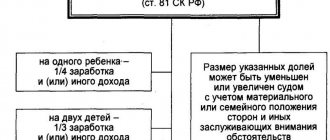According to current legislation, parents are required to support their children who have not reached the age of majority. That is why, in the event of a divorce, the father (mother) leaving the family is obliged to pay alimony. This article will help you figure out how to collect such a payment and what is required for this.
Features and regulatory regulation of the collection of child support
In paragraph 1 of Art. 80 of the RF IC stipulates the obligation of parents to support their children under 18 years of age. It applies to both mother and father. Therefore, in the event of a divorce, the spouse who begins to live separately is obliged to pay alimony.
REFERENCE. The main regulatory document regulating the procedure for calculating and collecting such payments is the RF IC. We are mainly talking about Chapter 13, which outlines the responsibilities of parents for maintaining a common child, the amount of such payments, the types of earnings from which they can be withheld, and other key conditions.
The process of collecting child support for a common child has the following key features:
- the provision of such financial assistance is an obligation from which it is impossible to escape;
- parents have the right to independently agree on the form and procedure for paying child support;
- collection of financial support for a child can be carried out by agreement of the parties or in court;
- Deprivation of parental rights is not a basis for exemption from paying child support.
Delay in payment of alimony and liability for it
Once a court decision has been made to collect alimony, it must be strictly implemented. If the defendant does not pay child support on time and the payment debt grows, he may be subject to penalties by law.
The RF IC has provided for the possibility of collecting a penalty or penalty, if provided for in the agreement, as liability for late payment of alimony and the formation of debt.
The amount of the penalty directly depends on the amount of debt and is calculated using the formula ½ percent of the amount of alimony that the debtor has not paid, multiplied by the number of days of delay.
Malicious evasion of one's alimony obligations for a child or disabled parent is a criminal offense.
Author of the article
Peaceful resolution of the issue of payment of child support - procedure
Current legislation does not prohibit resolving the issue of providing financial assistance to a child in a peaceful manner.
If it was decided to reach an agreement without court, then the parents must enter into an agreement between themselves on the payment of child support. The procedure for carrying out such a procedure is regulated by the provisions of Chapter 16 of the RF IC.
This document is an official agreement that defines such key conditions as the amount of payments for a common child, the conditions for their calculation and the procedure for their provision. There are two parties involved here:
- a person who is responsible for financial support of a minor;
- the recipient of these funds in the person of the child's legal representative (in this case it may be the mother or father, guardian, adoptive parent).
The process of concluding an agreement on the payment of child support for common children includes the following main stages:
- Preparing the document itself - you can do this yourself or contact a competent specialist. It is preferable to choose the latter option.
- Collecting the necessary papers that will be required from the notary.
- A visit to the notary's office to certify the agreement signed by both parties.
The agreement on the payment of alimony has the force of a writ of execution, therefore, if the other party fails to comply with its terms, the recipient of the funds can initiate enforcement proceedings.
What documents will be required?
To notarize an agreement to pay child support for a common child, applicants must collect the following documents:
- passports of both parties, that is, father and mother;
- certificate of birth of a common child;
- draft agreement on payment of maintenance for a minor;
- documents confirming the income received by the alimony payer during the last 3 months (for example, a bank account statement, a certificate from the workplace);
- payment details to which the money will be transferred.
ATTENTION! Concluding an agreement is a paid procedure. It includes the following main expense items: payment of the state fee for notarization of the document and payment for the services of a specialist who drafted the text of the agreement (if the parents asked for outside help).
The procedure for preparing an agreement on the payment of alimony
At the legislative level, a unified form of agreement on the payment of alimony has not been approved. However, it should include the following key sections:
- Information about the place and time of concluding such an agreement, personal data of both parties (full names of parents, passport details, information about registration and place of residence).
- Subject of the agreement - this section indicates that the payer undertakes to pay financial assistance for a common child. This also includes information about the recipient of the funds and the amount of the salary.
- Form of alimony payment and terms - this specifies how the payment will be made (for example, a fixed payment, a percentage of wages, etc.), as well as the exact date of each month when remittances should be received.
- Rights and obligations of both parties to the agreement.
- The period of time during which a document remains in force.
At the very end of the agreement there must be a signature of the payer and the recipient of payments for a common child.
Do I need to get it certified by a notary?
Yes, this is a mandatory condition, which is enshrined in paragraph 1 of Art. 100 IC RF. In case of non-compliance, such a transaction will be considered void. This conclusion follows from paragraph 3 of Art. 163 Civil Code of the Russian Federation.
How to achieve 100% payment of alimony? Experts spoke about problems with payments
Periodic alimony system
During the round table “SB. Belarus today” experts discussed all the nuances of collecting alimony
According to statistics, every day in our country about 120 people turn to bailiffs with a request to forcibly collect alimony.
Fortunately, most parents who are required to pay child support after a divorce do so regularly. But there are also those who come up with new schemes over and over again in order to avoid payments and not get into trouble with the law (long-term non-payment of alimony can result in criminal liability). And despite all the measures taken to change legislation in this area, problems still remain. We talked about how to achieve 100% payment of alimony in our country with experts who communicated a lot both with those who receive this money and with those who must pay it: Valentina Vatslavovna Kursevich , Deputy Chairman of the Standing Committee of the House of Representatives of the National meetings on health care, physical education, family and youth policy; Antonina Vladimirovna Druk , chief specialist of the legal support department of the main department of compulsory enforcement of the Ministry of Justice; Irina Ivanovna Bagnich , lawyer and mediator.
How the mechanism works. Who gets priority? Do I need a lawyer
I. Bagnich:
It must be admitted that the mechanism for collecting alimony today is quite simple. There are several options. If we are talking about the maintenance of a minor child (and there are no other recipients of alimony, for example, other children), then they can be collected in writ proceedings. To do this, you simply need to submit an application to the court to initiate proceedings. As a general rule, alimony is collected from the moment the application is submitted. The second way is to file a claim in court. As a rule, this happens when there are other recipients of alimony, even potential ones, or if the issue of the child’s place of residence or establishing paternity is being resolved at the same time. By the way, in one statement you can immediately formulate all interrelated claims. Today, it seems to me, there is not a person who does not know that in order to receive alimony it is enough to simply go to court. There are the necessary samples on the stands. In addition, applications for the collection of alimony are not subject to state duty.
A. Druk:
I'll tell you what happens next. If the debtor does not pay alimony voluntarily, the claimant may apply to the enforcement authorities. The mechanism is also simple - you need to submit an application to initiate enforcement proceedings and provide a writ of execution. Samples of such appeals can also be found in each enforcement agency. There is also no state duty. Enforcement proceedings are initiated on the day the application is submitted, and we begin work on collection.
V. Kursevich:
As a deputy, I cannot help but remind you that support and preservation of the family, fatherhood and motherhood are the main priorities of state social policy in our country.
Article 32 of the Constitution stipulates that family, marriage, paternity, motherhood, and childhood are under the protection of the state.
These constitutional provisions are reflected in law. Thus, the Code “On Marriage and Family” contains such concepts as a marriage contract, an agreement on the payment of alimony, an agreement on children and others. All these changes are aimed at giving parents the opportunity to resolve their conflict issues peacefully, turning only to a notary for certification of documents. Unfortunately, not all our citizens still know that such forms exist. Perhaps awareness would help avoid many conflicts.
A loophole for cunning alimony workers. What mediation can do. Is the minimum amount enough?
A. Druk:
I would like to draw your attention to another nuance. We, bailiffs, working with debtors, in most cases are faced with the main problem (in terms of collecting alimony) in the form of dishonesty of the payer, when he tries in every possible way to hide his income. As a rule, business managers do this. They deliberately underestimate their earnings, and the recipient receives minimal alimony. Cases of this type of scheme have become more frequent. According to the law, a debtor who fails to pay child support for more than three months during a year may be subject to criminal liability. Knowing this, he literally transfers pennies to the second parent’s account. Thus, their debt continues to grow, but the fact of payment is there, he even has a receipt. Law enforcement agencies will not be able to bring him to justice, since there is no corpus delicti. After all, there was a fact of payment (even if not in full), which means that he did not evade paying alimony.
I. Bagnich:
That is, he does not actually pay, but pays legally? It seems to me that the legislator needs to pay attention to this issue.
A. Druk:
Yes, that's what happens. The category that has been on the list of debtors for several years now acts in a similar manner. Those who do not know about criminal liability, as a rule, do not act this way. And those who know and are “scientific” can circumvent the law.
V. Kursevich:
So far no one has approached the deputies with a similar problem. I would like to note that during receptions of citizens other problems are raised. For example, the amount of alimony, the issue of fairness in spending alimony.
I. Bagnich:
I would like to remind you that these and other problems can be resolved through mediation. At mediation meetings with former or future spouses, we often discuss a universal document - a marriage contract, which includes various aspects of family life, both before and after divorce. It should be noted that one of the most pressing issues that we discuss during negotiations, which are very difficult and lengthy (sometimes they last in numerous sessions for up to 20 hours), is the issue of maintaining a child and a second spouse. As a rule, the stumbling block when discussing alimony issues is the amount. Spouses always know each other's real income level. But during negotiations, we try not to focus only on the amount of alimony, but discuss the issue of participation in the maintenance of the child in a comprehensive manner. After all, the amount of alimony may be the same, but at the same time the father, for example, can fully pay for a very expensive education in private educational institutions, clubs, summer and winter vacations. Such nuances can be specified in the marriage contract. If, after the conclusion of the transaction, one of the parents wants to make changes to the marriage contract, they will need to conclude an additional agreement or go to court (if one of the parties disagrees). By the way, based on my practice, when spouses make changes to the contract, the adjustment, as a rule, concerns precisely the amount of alimony. Debtors often take advantage of this opportunity: in order to avoid the risk of criminal liability for evading payment of alimony, they go to court with a request to change the amount of alimony specified in the agreement.
About spending money for other purposes and responsibility
V. Kursevich:
Child support debtors are not the only problem. I specifically took with me an appeal that our commission received not so long ago. The author makes a proposal to the legislator to include in the Code “On Marriage and Family” the obligation of non-cash calculation of alimony, as well as its subsequent expenditure through non-cash payments and provision of a report on the expenditure of these funds. He justifies this by saying that he is sure that the money he transfers for the child is being spent by the mother for other purposes. But again, I want to remind you that in the Code “On Marriage and Family” we have already prescribed the possibility of signing an agreement on the payment of alimony. With its help, you can calmly resolve all issues, including payment method and control. In my opinion, when making changes in this area, we must remember that the most important thing is the rights of the child, so that he is protected, including financially.
I. Bagnich:
Unfortunately, the question of exactly what part of child support (for what purposes) the alimony payer provides funds is not specified in the agreements. Therefore, we are often asked the question: what should I do if I know for sure that money is being used for other purposes? Today you can contact the guardianship authorities, for example, to notify that such a situation exists. A preventive conversation may be held with the recipient. As a lawyer, I can say that if this fact is somehow established, it can be used in further disputes between parents, if any arise. But at the same time, you need to understand that establishing the fact of misuse of alimony will not help in any way to reduce it.
What to do if your spouse fled to another country. Why do we need an international convention?
A. Druk:
Until 2021, citizens had some difficulties in collecting alimony from persons who live in another state. But on July 1, 2021, our country joined the Convention on the International Procedure for the Collection of Child Support and Other Forms of Family Maintenance. In particular, it was signed by countries such as the USA, Germany, Turkey...SEE ALSO
I. Bagnich:
...Italy, Cyprus, Latvia, Lithuania and others. There are 38 states in total. This is a big step for our country in the development of legislation relating to the protection of children’s property rights.
A. Druk:
In two years, we have already registered more than 70 requests. The largest number of requests concerns the collection of alimony from debtors located in the UK, USA, Turkey and Germany. Our international department currently has about 50 cases in progress.
I. Bagnich:
If we analyze the convention, it turns out that all procedures will last at least six months. This is the case if the defendant is not hiding. Otherwise, he will be put on the wanted list and the resolution of the issue will be postponed for some time. But this period is still less than it was before we ratified the convention.
A. Druk:
An Agreement has been concluded between Belarus and the Russian Federation on the procedure for mutual execution of court decisions in cases of alimony collection. Our court decisions on the collection of alimony are executed on the territory of Russia without a recognition procedure. You can find out information about enforcement proceedings in Russia on the official website of the Federal Bailiff Service.
New in legislation. What to do if you are laid off at work or are leaving to work
V. Kursevich:
Starting in July of this year, approaches to calculating alimony arrears will change. Last year, at our task force meeting, many questions on this topic were discussed from constituents who had divorced their spouses. In November, in the second reading, we adopted amendments to the Code “On Marriage and Family” that relate to this issue. Today, if the debtor does not work and receives some income, then this amount is the basis for calculating alimony. If he does not work and has not provided documents on income, then the basis for calculating alimony becomes his average salary at his previous place of employment. If more than 3 months have passed since his dismissal, then the average salary in the country as a whole is taken as a basis. Now the rules will change. Sometimes in the regions the average salary and the national average are very different. In addition, the debtor may also have his own valid reasons. For example, he was laid off or left without work and cannot find a vacancy for 3–6 months. This does not mean that he deliberately does not pay. Life circumstances just happened that way. It is assumed that the basis for the calculation will now be the cost of living budget, and not the average salary. This is the innovation that awaits us. Another change concerns bona fide alimony payers who plan to leave for a while. They will be able to pay them in advance, for any period.
I. Bagnich:
What if during this time he earns more, but alimony is paid “in advance” from a smaller amount?
V. Kursevich:
If he is a conscientious citizen, he will pay the difference (of course, if there are claims on the part of the applicant). Or he will be able to compensate his child for this without any legal proceedings.
About conscience and coercion
V. Kursevich:
I believe that the whole root of the problem is that people, when entering into marriage, do not always understand: it is necessary to make a lot of effort on the part of both the woman and the man in order to save the family. Sometimes the cause of discord is that one of the parties does not want to fulfill responsibilities. I recently got acquainted with the results of a multi-indicator cluster survey of the situation of children and women in our country, which was conducted as part of the 2021 population census. The majority of women interviewed were in favor of a full-fledged traditional family. At the same time, the husband, in their opinion, should share responsibilities with his wife. This is not surprising, because today women’s contribution to both the economy and the family is quite high. And sometimes it exceeds the man’s contribution. I am for people to meet each other halfway, to find compromises and to preserve families.
When a couple breaks up, it is difficult emotionally to resolve all issues peacefully. And legal proceedings begin, which sometimes drag on for many years and always, at least indirectly, affect the child.
I. Bagnich:
I’ll echo the idea: evasion or concealment of income is a consequence of the not very high culture of some of our people. They don’t know how to negotiate, and sometimes they just don’t want to. Most often, there are also personal grievances associated with the breakdown of the family. And they transfer these emotions to the child, who becomes an instrument of revenge. By not providing for the mother, the second parent does not understand that he is taking away funds from his child. When a conflict escalates, when people disperse in an uncivilized manner, children suffer. Not only psychologically, but financially too. In Europe, for example, legislation in this regard is more stringent. A current example we are currently working with. We learned that one of the couples in non-CIS countries (she is Belarusian, he is a citizen of another country) divorced. This was preceded by a separation procedure. Spouses must live separately for some time before divorcing. And the court, regardless of his level of income, imposed on the father the obligation to purchase housing in which the child and mother would live until the trial. He was forced to take out a mortgage and buy an apartment. Now he can barely make ends meet. All this was necessary to ensure that the child did not suffer while the parents were arguing, resolving their issues.
A. Druk:
I would like to remind you that enforcement authorities take all possible measures to collect alimony from the debtor. If he has money or other property, then foreclosure on it will not be difficult. Today, there are enough mechanisms to oblige the debtor to fulfill the requirements contained in the executive documents (seizure of property, restrictions on the right to travel outside the country, restrictions on the right to drive a vehicle are among several measures that can be taken against him). It’s just that in a number of cases it is impossible to understand people who may say that failure to pay alimony is the mother’s revenge for the divorce or that since she decided to get a divorce, even if she supports the children herself. This is a matter of every person's conscience. I would like to remind you that you can stop being spouses, but it is impossible to stop being a parent to your child.
Svetlana Isaenok, “SB. Belarus today”, February 25, 2021 (photo
–
“Sat. Belarus today")
Collection of alimony through court
If the issue of paying child support cannot be resolved peacefully, then the only way out is to go to court. This is written in paragraph 2 of Art. 80 IC RF.
The following categories of persons have the right to file a claim in court for the recovery of alimony:
- the second parent with whom the child remains to live;
- guardian (adoptive parent) of the baby;
- guardianship and trusteeship authorities.
The judicial procedure for collecting child support payments can be carried out through a claim or an order. In the latter case, the process is implemented according to a simplified scheme.
Claim procedure
The claim procedure refers to the classic version of collecting child support. In this case, Chapters 12-22.3 of the Code of Civil Procedure of the Russian Federation come into force.
The key feature of litigation is that it is used in cases where there are disputes between parents regarding:
- the amount and procedure for payment of alimony;
- establishing paternity;
- other types of disagreements.
The process of collecting child support through a claim includes the following steps:
- Choosing a judicial authority to file a claim - if the question concerns only the collection of alimony, then you need to contact a magistrate. If there is a need to establish paternity, then the claim should be filed in the district court.
- Preparation of a statement of claim - the rules for drawing up such a document are described in Art. 131 Code of Civil Procedure of the Russian Federation. The content of a claim for alimony must include the following information:
- the name of the court to which the application is filed;
- information about the plaintiff and defendant;
- description of the circumstances (this indicates who the participants in the proceedings are for the minor, with whom the child lives, etc.);
- expression of demands in relation to the defendant, indicating the type of payment, form of recovery, desired amount;
- information about attempts made to resolve the issue peacefully.
IMPORTANT! It is better to entrust the preparation of a statement of claim for alimony to an experienced lawyer. In this case, it is possible to take into account the features of a specific situation as much as possible in the document.
- Collection of documents - they will go as attachments to the claim. This includes:
- a receipt confirming payment of the state duty;
- power of attorney for the representative of the plaintiff (if necessary);
- baby's birth certificate;
- certificate of divorce from the defendant;
- a document confirming paternity (if the parents were not officially married);
- paper confirming attempts made to resolve the issue of alimony in pre-trial order.
- Once the complete package of documents has been prepared, it must be delivered to the court in any convenient way (for example, a personal visit, by registered mail, through a representative, etc.).
- Waiting for a summons to a meeting, taking part in court proceedings and receiving a ready-made decision on the calculation of alimony.
It can take up to 2 months to collect alimony through a lawsuit, and if additional circumstances and disputes are identified, this period can increase up to a year.
Order procedure (simplified procedure)
The writ procedure means a simplified procedure for collecting financial support for a child. It is characterized by the following features:
- after considering the case, the court issues a court order;
- faster decision-making time;
- reduced state duty;
- the parties do not take part in the process.
ATTENTION! To use this option, the following condition must be met (Part 5 of Article 122 of the Code of Civil Procedure of the Russian Federation) - the requirement to pay alimony should not relate to establishing or challenging paternity, and should not involve the involvement of other interested parties in the process.
To resolve the issue of paying maintenance for a minor by order, the following papers will be required:
- application for an order;
- receipt of payment of the duty;
- birth certificate of the baby (it must contain a note about the father and mother);
- a certificate of family composition, which shows that the child lives with the claimant;
- document on divorce;
- power of attorney for a representative.
Depending on the circumstances, other documents may be required. Consideration of an application for the calculation of alimony by order includes two stages:
- Initial acceptance of the document (return or refusal to consider) - if a positive decision is made, the court will make an appropriate determination.
- Issuance of a court order containing information about the established procedure for paying alimony and the amount of such transfers.
The general period for making a decision on calculating alimony by order is 5 days from the date of filing the application.
Payment of state duty
When collecting alimony through the court, the plaintiff will have to pay a state fee. Its size depends on the way this process is organized:
- Claim procedure - the amount of state duty will be 150 rubles. If a claim for payment of monetary support is included in the claim in favor of the plaintiff himself, the fee will double and amount to 300 rubles. Conclusion from paragraphs. 14 clause 1 art. 333.19 Tax Code of the Russian Federation.
- Mandatory procedure - the duty will be less by 50% (clause 2 of Article 123 of the Code of Civil Procedure of the Russian Federation).
Grounds for assigning alimony in a fixed amount
In order to collect alimony in a fixed amount, certain conditions are necessary, namely, that the parent from whom it is required to collect alimony in a fixed amount:
- had irregular earnings that are constantly changing, or any other irregular income;
- received earnings or other income not only in monetary terms in rubles, but also in kind or in foreign currency. Moreover, the parent may receive such income in whole or in part in kind or in foreign currency;
- had no earnings or income at all;
- received income, but at the same time collecting alimony from him in the amount of a share of the income is impossible, or very difficult, or such collection significantly violates the interests of one party;
- was better off than the other parent, and the children remained with each parent, i.e. the parent who is more wealthy pays alimony in a fixed amount in the interests of the child living with the less wealthy parent.
The main purpose of collecting alimony in a fixed amount is to preserve the child’s previous standard of living as much as possible.
Special cases
Sometimes in practice there are special cases when the marriage between the child’s parents was not registered or the child has reached the age of majority. In such situations, the question arises of how to properly formalize the procedure.
Marriage not registered
If the mother and father were not in a legal relationship, then the process of collecting child support may have the following features:
- before going to court for alimony, the fact of paternity must be legally established (if there is no record of the father on the child’s birth certificate);
- the claim to establish paternity can also include a requirement to accrue financial support for the child;
- if the father is indicated on the birth certificate, then the issue of alimony can be resolved in the general manner (through claim or writ proceedings), the only difference will be that you do not need to attach a document confirming the dissolution (conclusion) of the marriage to the application.
Children have reached adulthood
By law, the obligation to make child support payments ends when the child reaches the age of majority (18 years old). However, in some cases, the payer must pay child support even after the child reaches this age.
In accordance with paragraph 1 of Art. 85 of the RF IC, parents are obliged to continue to support adult children who cannot take care of themselves. We are talking about disabled persons over 18 years of age.
In such a situation, the father (mother), who is dependent on such a child, has the right, through an agreement or in court, to demand the payment of alimony from the second parent. You will need to additionally attach documents to your application confirming the child’s inability to take care of himself.
How to label child support
Banks are ready to filter clients’ income, but there is a problem, says Sergei Klimenko, the main issue concerns transfers by individuals, for example alimony. According to him, we are not talking about cases where a bailiff, through an employer, forcibly seeks payment of alimony, but about cases when the citizen himself voluntarily pays. “Conventionally, the child’s parents may have a notarial agreement, according to which one of them voluntarily transfers a certain amount to a specific account. When an individual pays alimony on his own, he does not indicate the type of income code,” explains the lawyer.
In this regard, the question arises whether the client is required to mark the transfer of funds in accordance with the new amendments. If so, then banks should convey this information to their clients, points out the head of the ADB's legal department. Most bank clients are not aware of such markings - they transfer money using a phone number, and they do not have the opportunity to indicate the type of income code. “At most, the client can write a message to the recipient,” adds Klimenko.
Banks asked the Central Bank and bailiffs for help in the fight against cashing out Finance
According to ADB estimates, 95% of alimony transfers to clients of large banks are payments for child support. Credit institutions fear that, despite the amendments, customer complaints about incorrect write-offs will not stop. Banks will be subject to administrative liability, Klimenko emphasizes: “The so-called client immunity from incorrect crediting and debiting of funds against the debt will not appear.”
Representatives of VTB and Rosselkhozbank told RBC that their systems are ready to filter cash receipts into client accounts in order to protect social benefits and alimony from collection, but organizations will check the assignment of payments to individuals in different ways.
VTB has updated its services so that clients have the opportunity to indicate the code of the type of income in the payment document. “A new field “translation type” will appear, which will have a fixed drop-down list of three source options. The payer is responsible for indicating and correcting the type of income code. In the absence of information about the code, such funds will not have immunity from seizure or collection,” explained a bank representative.
Rosselkhozbank believes that indicating the type of income code is the responsibility of the client himself. “The bank is interested in bringing such information to its individual clients by posting the necessary information, for example, on the bank’s website,” said a representative of the Russian Agricultural Bank.
Other large banks and the Central Bank did not respond to RBC's requests.
Initiation of enforcement proceedings
If, after a court decision to pay alimony, the payer still evades this obligation, the recipient has the right to turn to bailiffs for help.
The procedure for initiating enforcement proceedings is described in detail in the Federal Law of the Russian Federation dated October 2, 2007 No. 229-FZ.
What documents to provide to bailiffs
In order for a bailiff to initiate enforcement proceedings in the case of collection of child support, the interested person (usually the recipient of these funds) must provide the following documents to the territorial division of the FSSP:
- statement;
- executive document (this may be a court decision or an agreement on the payment of alimony, violated by the payer);
- child's birth certificate;
- details of the bank account to which alimony payments should be transferred.
REFERENCE. Enforcement proceedings can be initiated not only on the basis of a court decision, but also if there is an agreement on the payment of alimony, since this document has the force of a writ of execution.
Legal ways to influence a debtor
Bailiffs are authorized to use various mechanisms of influence on persons who do not want to fulfill their parental duty to their children. Such instruments of coercion include:
- seizure of the debtor's property;
- automatic debiting of money from a bank account;
- restrictions on crossing the borders of the Russian Federation;
- imposing a temporary ban on driving;
- accrual of fines and penalties, etc.
IMPORTANT! If there are signs of malicious evasion of alimony obligations, a criminal case may be initiated against the debtor. Therefore, it is strongly recommended not to hide from bailiffs.
Suspension or termination of enforcement proceedings
The law provides for situations when enforcement proceedings may be suspended. Is it possible:
- if the recipient of alimony himself has submitted a corresponding application (this happens when the parties manage to resolve the issue peacefully);
- the debtor has lost legal capacity;
- bankruptcy procedures, etc., are applied to the parent obligated to pay child support.
In Art. 120 of the RF IC also describes a list of situations in which alimony obligations, and therefore enforcement proceedings, are terminated. This can happen under the following circumstances:
- the child has turned 18 years old or has become legally competent before reaching the age of majority;
- the baby is adopted by another person;
- the recipient of the funds has died;
- the death of the person obligated to pay alimony has occurred.
How to calculate alimony in a fixed amount?
When calculating alimony in a fixed monetary amount, it is necessary to justify the appropriate amount of alimony, i.e. confirm that, for example, before the dissolution of the marriage between the parents, such and such an amount of money was used to support the child, such and such an amount was spent on the child’s attendance at classes, etc., in connection with which, in order to ensure the child’s maintenance previous standard of living, it is necessary to collect alimony from the defendant in a fixed amount. Also, in support of his arguments, the plaintiff must provide receipts, checks, and other documents confirming what amounts are spent to provide for the child.
ATTENTION : do not forget about the grounds for collecting alimony in a fixed fixed amount.
Amount of child support payments
The amount of child support depends on the method of collection. If this happens by agreement of the parents, then they have the right to independently agree on the exact amount.
When resolving an issue in court, the following limits apply (clause 1 of Article 81 of the RF IC):
- 25% of income (per child);
- 33% for 2 children;
- 50% (if there are three or more children).
ATTENTION! When determining the amount of alimony payments in the agreement, their value should not be less than the above percentage of income. However, charges may exceed these limits.
Forms of payment of alimony
The RF IC provides for several methods of paying child support, each of which has its own characteristics. There are the following forms of payment:
- as a percentage of monthly income;
- fixed payment;
- in the form of a one-time transfer of a large amount;
- provision of property to a minor.
Thus, family law provides for two main ways of assigning alimony: within the framework of an agreement concluded between the parents and through the court. The latter method may have the format of a claim or an order (simplified procedure).
How to cancel alimony in a fixed amount?
If the court of first instance has collected alimony from the defendant in a fixed sum of money, then the defendant has the right to appeal the court decision within the prescribed period.
If for a certain time the defendant paid alimony in a fixed amount by court decision, but the circumstances that served as the basis for collecting alimony in a fixed amount have changed, in this case the alimony payer can apply to the court with a claim to change the amount of alimony established by the court, since the grounds for the collection of alimony in a fixed amount are not available at the time of filing such a claim, i.e., for example, the plaintiff (the defendant in the claim for the collection of alimony in a fixed amount) has a permanent job with a constant income.
Agreement on payment of alimony
An agreement to pay alimony is concluded voluntarily by the parties in writing and is notarized. The absence of notarization entails its invalidity. After notarization, such an agreement between two persons acquires the force of an executive document.
The contract for voluntary payment of alimony includes:
- payment method;
- payment procedure;
- size. The amount of alimony for minor children agreed upon by the parties cannot be set less than the amount that would be due to the party in the event of judicial collection.
The parties have the right, by mutual agreement, to terminate the agreement reached at any time. Termination by one person is unacceptable from the point of view of current legislation. If there is disagreement with the established amount of alimony or the need to change the agreement, in the absence of an agreement, the party to the agreement has the right to apply to the court to change or terminate the agreement.
MORE DETAILS:









